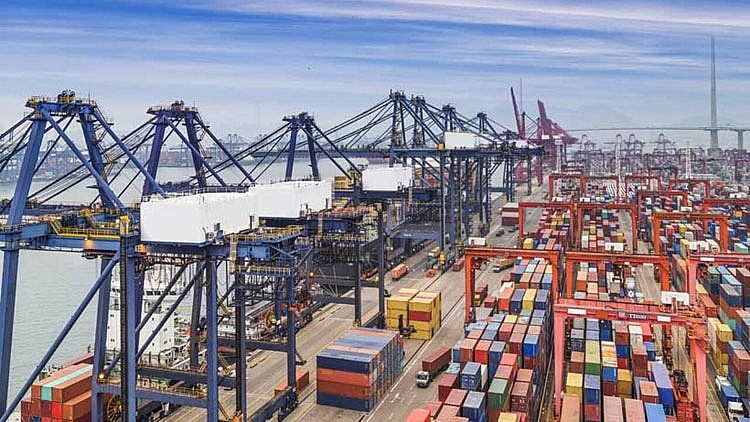Total number of posts 468.
Since June 2, the Regional Comprehensive Economic Partnership (RCEP) has officially entered into force in the Philippines, meaning that the world's largest free trade agreement is now valid for all 6 members. Since it was signed in November 15 and officially entered into force on January 11, 2020, RCEP has promoted trade and investment inside and outside the region, as well as created favorable conditions for the development of member economies.

RCEP implementation will bring many opportunities for small and medium-sized enterprises
As a member of RCEP, Vietnam is witnessing steady growth in imports and exports. In 2022, Vietnam's export turnover reached over 730 billion USD, up 9.1% over the previous year (equivalent to an increase of 61.2 billion USD). Generally, in the first 8 months, the total export and import turnover of goods reached 227.71 billion USD.
Ms. Ee-Hui Tan, Chief Operating Officer of FedEx Vietnam and Cambodia, said: The entry into force of RCEP with all 15 members will help Vietnam achieve more benefits, such as strengthening its trade position, bringing positive impacts to boost the country's economy.
Specifically, according to Ms. Ee-Hui Tan, RCEP is Vietnam's 15th Free Trade Agreement (FTA), as well as the largest FTA today, covering a huge market with an estimated 1/3 of the global population, has a diverse membership structure with 15 countries and has the highest development potential. According to the roadmap committed in RCEP, member countries will reduce tariffs; market opening in the fields of goods, services and investment; reduce trade barriers and strengthen economic and trade ties in the region. When the potential from RCEP is properly harnessed by member countries, Asia's trade and investment turnover with partner countries will increase rapidly, creating a positive impact on the region's value chain.
Accordingly, small and medium enterprises (SMEs) in Vietnam will have many opportunities to participate in new supply chains created by RCEP if they fully exploit the benefits brought by the Agreement, especially in the potential investment environment with the full support of policies, orientation of the Government of Vietnam.
"SMEs, which account for 98 per cent of all enterprises in Vietnam and contribute significantly to Vietnam's trade landscape, will benefit as RCEP offers opportunities to help them move up the supply chain. In addition to tariff reduction, RCEP also provides customs facilitation measures, lifts trade barriers so that these enterprises can expand development space in international markets, and at the same time build a favorable environment for competitive investment, contributing significantly to the overall growth of the country's foreign trade," Ee-Hui Tan pointed out.
According to Ms. Ee-Hui Tan, there are 3 main benefits for businesses, especially small and medium enterprises as well as SMEs of Vietnam when RCEP is implemented.
First, improve the efficiency of customs clearance thanks to streamlined customs procedures. RCEP highly appreciates the contribution of SMEs to the growth of the economy, so this Agreement focuses on trade facilitation, reducing transaction costs will be the driving force for production and import and export of small and medium enterprises. Through measures such as: Pre-shipment inspection, origin determination, pre-arrival processing, pre-determination of codes and values or Risk management, RCEP creates a framework to simplify customs procedures and speed up customs clearance, enabling businesses to participate more deeply in supply chains, as well as regional production and value chains more efficiently.
Second, create momentum for trade growth. A major benefit of RCEP for SMEs in Vietnam is the tariff elimination schedules set out by this Agreement, which facilitate both import and export activities at reasonable tariff rates, based on existing tariff reduction commitments and will eliminate about 90% of import tariffs within 20 years from The agreement entered into force.
According to a report published by the World Bank, Vietnam is likely to achieve the highest increase in income and trade among RCEP members between 2020 and 2035. The World Bank report specifies: In a productivity growth scenario, including a productivity shock, trade would be the sector with the strongest growth, with exports up 11.4 percent and imports up 9.2 percent. This forecast further highlights the positive impact that RCEP is expected to bring to Vietnam's trade activities.
In addition, the World Bank also predicts that when non-tariff measures are reduced thanks to RCEP, many of Vietnam's manufacturing sectors will record significant growth, the highest being textiles and garments (16.2%) and followed by apparel (14.9%). This growth not only provides a strong motivation for SMEs to expand their business globally but also contributes to realizing Vietnam's goal of becoming a global manufacturing hub.
Third, pave the way for cross-border investment opportunities. RCEP's tariff cuts bring significant benefits to Vietnam's SMEs seeking to expand their presence in the market through cross-border e-commerce. First, SMEs can effectively optimize production costs by accessing more affordable raw materials from international sources. In addition, SMEs can price their products more competitively when accessing foreign markets in the context of the removal of a large number of tariff lines (from 64%-82% of tariff lines).
However, these benefits also come with many challenges related to the speed of cross-border deliveries as well as the complexity of international transportation networks. To fully exploit the potential of trade development in the region, SMEs in Vietnam need the support of a professional and reliable cross-border logistics partner. These partners can help SMEs take advantage of the benefits of RCEP and handle duties, complex import and export rules, or shipping risks due to external factors. "As the world's leading shipping group, FedEx actively supports SMEs in Vietnam by organizing seminars or online forums on how to successfully unlock cross-border trade investment opportunities," added Ms. Ee-Hui Tan.














